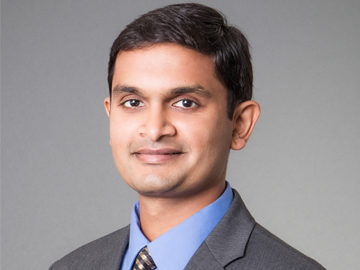Ketan Savla
Research Fellow
Ketan Savla, Ph.D., is the John and Dorothy Shea Early Career Chair in Civil Engineering and an associate professor in the Sonny Astani Department of Civil and Environmental Engineering, the Ming Hsieh Department of Electrical and Computer Engineering, and the Daniel J. Epstein Department of Industrial and Systems Engineering at USC. He is also a co-founder and the chief science advisor of Xtelligent, Inc., a smart urban mobility startup. Prior to joining the faculty at USC, Dr. Savla was with the Laboratory of Information and Decision Systems at MIT, first as a postdoctoral associate and then as a research scientist.
Dr. Savla’s research focuses on characterizing fundamental limits on efficiency and resilience of large-scale societal systems due to physical and behavioral constraints of its constituents, and in leveraging technological and algorithmic advancements to overcome these limitations. In particular, he has developed algorithms to control the routing of flow in transportation and energy networks using real-time information to withstand maximal disruption. Some of the underlying algorithms are being field-tested through his startup.
He has also provided quantitative insight into the role of networked structure of a system, the type of real-time control, and decentralization of control operation, on the extent to which the system is able to maintain its functionality under a given disruption. Such insights are useful for pre-disruption resilience planning.
Dr. Savla was a recipient of NSF CAREER, and a co-recipient of the George S. Axelby Outstanding Paper Award from the IEEE Control Systems Society for the paper “Robust Distributed Routing in Dynamical Networks – Part II: Strong Resilience, Equilibrium Selection and Cascaded Failures.” He is also a recipient of the Donald P. Eckman Award from the American Automatic Control Council, an entity spanning nine professional societies, for “fundamental contributions to cyber-physical systems, network flows, queueing systems, and combinatorial optimization applied to transportation and robotics.”
He has been a principal investigator or co-principal investigator on several grants from the National Science Foundation, Caltrans, U.S. DOT, and Department of Defense. This research has led to refereed articles in leading journals of the field, including IEEE Transactions on Automatic Control, IEEE Transactions on Control of Network Systems, SIAM Journal of Control and Optimization, Proceedings of the IEEE, Transportation Research – Part B, and AIAA Journal of Guidance, Control and Dynamics.
In a series of recent projects funded by Caltrans and the National Science Foundation, Dr. Savla is looking at the role of information structure on performance, in terms of efficiency and resilience, of large-scale transportation networks. It is arguably impractical to real-time control traffic flow in a centralized manner using the entirety of the huge amount of streaming live data. Distributed architecture provides a scalable and robust alternative. He has been studying the tradeoff between ease of implementation and loss in performance due to distributedness of control operation. Dr. Savla is also exploring the paradigm of information design, whereby a system planner selectively randomizes information available to individual decision makers (e.g., route choice of drivers) to influence their decisions so as to minimize a social cost (e.g., during evacuation). Such a design is naturally constrained by behavioral considerations. Dr. Savla is developing methodologies to formalize such constraints and to solve the associated information design problem.
Professor Savla served as an associate editor of IEEE Transactions on Control of Network Systems, IEEE Control Systems Letters, IEEE Transactions on Intelligent Transportation Systems, and the conference editorial board of the IEEE Control Systems Society. He regularly serves as a program committee member/co-organizer for workshops and conferences on topics at the interface of smart cities, transportation, and control systems. He teaches transportation courses both at the undergraduate and graduate level. He also teaches graduate courses on systems theory. Collectively, these courses attract students from civil engineering, electrical engineering, aerospace and mechanical engineering, industrial and systems engineering, biomedical engineering, and public policy.
Dr. Savla received his B. Tech. in Mechanical Engineering from IIT Bombay in 2003, M.S. in Mechanical and Industrial Engineering from the University of Illinois, Urbana-Champaign in 2004, M.A. in Applied Mathematics and Ph.D. in Electrical and Computer Engineering, both from the University of California, Santa Barbara, in 2007.

